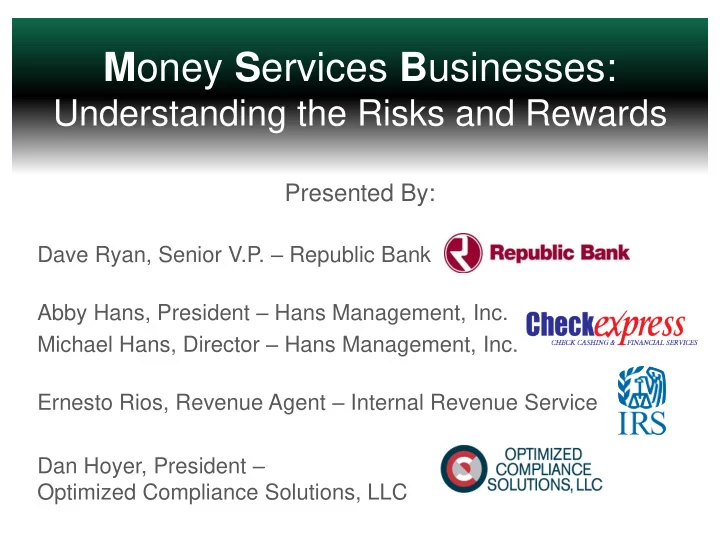

M oney S ervices B usinesses: Understanding the Risks and Rewards Presented By: Dave Ryan, Senior V.P. – Republic Bank Abby Hans, President – Hans Management, Inc. Michael Hans, Director – Hans Management, Inc. Ernesto Rios, Revenue Agent – Internal Revenue Service Dan Hoyer, President – Optimized Compliance Solutions, LLC
Introduction Recent Headlines
Introduction Who are money services businesses (MSBs)? Check cashers Money transmitters Issuers & sellers of money orders & travelers checks Dealers in foreign exchange Providers & sellers of prepaid access Agents Varying degrees of risk
Introduction Why do customers use MSBs? Convenience Preference Lack of options
Abby Hans President Hans Management, Inc.
History of the Check Cashing Industry The Great Depression 1931: Northside and Southside 1946: Licensing and Regulation Creation of the CCEA 1950’s Growth 1970’s No Good Deed Goes Unpunished Bank Secrecy Act
History of the Check Cashing Industry 1990: FinCEN 1992: NaCCA Alliances with Western Union & MoneyGram 1997: FiSCA 1999: EFT ’99 2000: How Do You Like Me Now?
History of the Check Cashing Industry 2001: 9/11 USA Patriot Act (Oct. 2001) 2014: Increased Electronification and Staff Oversight
Michael Hans Director of Operations & Compliance Officer Hans Management, Inc.
Currency Exchange Operations Products and Services Financial, Business and Governmental Daily Operations and Procedures Security POS BSA/AML Compliance Recording/Reporting Store Reconciliation, Balance and Closeout Personnel Company Structure
Currency Exchange Operations Personnel (continued) Training Products/Services Compliance (BSA / AML) Initial and Ongoing Accounting/Bookkeeping Audits/Examinations Random store balances/audits (in-house) State of Illinois – DFPR Title 31 - IRS
Currency Exchange Operations Audits/Examinations (continued) Independent Review - BSA / AML Program Partners/Principals (Bank, Money Transmitter, etc.) Compliance Officer Responsibilities Outsourcing BSA / AML Program Develop, Implement and Maintain Monitor transaction activity Assist with reviews/audits/exams Point of contact for BSA / AML related matters
Dave Ryan Senior Vice President Money Services Businesses Division Republic Bank
Problems / Benefits The government has categorized MSBs as high-risk accounts. A greater degree of monitoring and costs. Risk, perceived or otherwise, needs to be rewarded. What are the benefits? Scale – while overall relationships are critical to understanding your MSB customer, this is a transaction, fee-based business model. The scale needs to be such to compensate for the investment in products, services, and personnel that are unique to the MSB industry. Once initial investments are made, fee income can be very important for a bank’s bottom line.
Two main types of risk Credit Uncollected funds, cash on delivery, overdrafts, B2B, returns, etc. Does the compliance officer care about the credit risk? It’s about knowing your customer. Compliance Multiple bank relationships Commercial check cashing Policies and procedures – corporate, ACH, BSA, etc. BSA requirements FinCEN’s “culture of compliance” Independent reviews It’s all about “transparency”
Other risks Reputational Hard to define but it is real “I only care if this check is good or not” to “Do I want to be doing business with this person or company?” Operational Balancing Processing returns ACHs
Banking MSBs Have a policy that identifies the risks: Cash-based businesses Immediate availability of funds Cash orders / wires Kiting Overdrafts BSA / AML Tax evasion Registrations / Licensing KY customer KY correspondent Agency relationships Corporate check cashing
Banking MSBs Have a set of procedures that mitigates these risks: Identify the type of MSB and the state and federal licensing requirements Underwrite the accounts similar to credit / macro-study sets expectations. Distributions, is capital adequate, trends on makers and payees…can the MSB afford it? Set limits Limit bank relationships Establish lines of credit where needed Analyze the MSB’s policies, procedures, independent reviews, and audits (financial, ACH, etc.) Transaction monitoring – balances, returns, paid items Correspondent reviews, onsite visits, etc. Staffing (credit / operations)
Trends The pressure continues (for many years now) to increase for the bank to know its customers’ customers. Checks have been declining in volume placing more and more pressure on capital requirements and personal financial support. Drives MSBs to take on higher risk checks and to try to outpace decline with expansion. This in turn places greater demand on capital.
Ernesto Rios Revenue Agent Workload Identification, Selection, Delivery, and Monitoring (WISDM) Internal Revenue Service
AML Program Requirements Policies, Procedures and Internal Controls Risk-based Consistently implemented Monitored Compliance Officer Delegated duties Branch/Agent Locations High Risk Identify/monitor transactions Terminate agents
SAR Review Process Identify unusual activity Research sender/beneficiary for prior transactions Decision File – based on all facts Not file – know the customer/business purpose Monitor for future transactions
“Know Your Customer” • Not required by MSBs • DOJ - “Virtually impossible for a financial institution to have an effective SAR program unless they have a “Know Your Customer” requirement ”
“Know Your Customer” – Risk-based – Customers with a higher volume of recurrent transactions • $25,000 / 12 month period – Source of funds – Business purpose – Terminate relationship
AML Program Requirements • Training – Adequate and timely • Independent review – Frequency is risk-based – Transactional testing – Plan to address deficiencies
AML/CTF Compliance Programs for MSBs Developing 4 pillars Maintaining Changes in regulations New products/services Monitoring IRS Examinations Letter of Intent to Examine On-site visit Closing interview
Closing / Q&A
Conclusions Not all MSBs pose the same risk Not all banks should service the industry Servicing MSBs can result in: A significant source of income Improved infrastructure for future growth
Entering the Market ““The financial services industry must learn to intelligently embrace risk. This will be encouraged by regulators who are good risk managers themselves.” – Jim Harper, global policy counsel for the Bitcoin Foundation
Exiting the Market “Chances are the risk is still coming back to us, it’s just less transparent.” – Bob Werner, global head of financial crime compliance for HSBC
Questions?
Recommend
More recommend